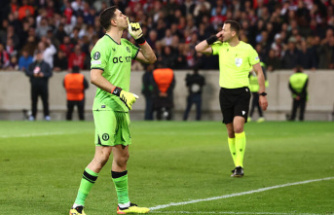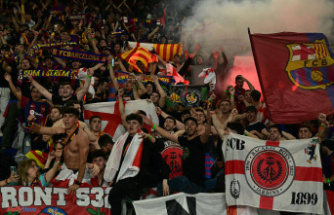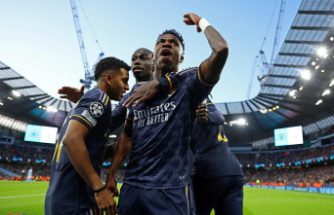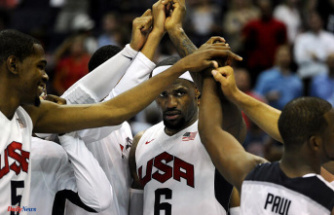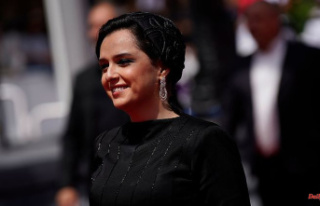The final of the soccer World Cup is also the duel between the superstars Messi and Mbappé. The biggest game of the football year will be officiated by a team of referees, which should be discussed beforehand. Worth it. Also because there shouldn't be any reason to do it afterwards.
With the final between Argentina and France on Sunday (4 p.m./ ARD, MagentaTV and in the live ticker on ntv.de), the soccer World Cup between the global superstars Lionel Messi and Kylian Mbappé got a final that will deliver many stories. The team of referees led by Szymon Marciniak wrote their own before kick-off. The Pole had a special career: it all started with a red card, but heart disease almost ended it too early. And his assistant repeats family history, in which the German and Argentinian national football teams play a very important role.
Marciniak's path to this final is tough and unusual. He begins with a red card sometime in the early part of this millennium. At the time, Marciniak was playing upscale amateur football for his home club Wisla Plock when he was sent off during a game. In the ensuing tirade, he lets the referee know he's the worst he's ever seen. And the rudely abused responded, "If you think you can do better, try it!"
And Marciniak, then in his early 20s, tried and he did well. "I'm very grateful to him, because without the red card I might never have become a referee," he says today. Marciniak made his debut in the Ekstraklasa, Poland's top division, in 2009 and has been a FIFA referee since 2011. Marciniak whistled at the 2016 European Championships and the 2018 World Cup and he would have been at the 2020 European Championships - but then Corona struck. In a double sense.
First the European Championship was postponed because of the pandemic, then the referee fell ill. "I ran away from the virus, but I was too slow," he jokes later. But it's not funny how it goes on afterwards: "It was very difficult for me at the beginning and I had to stop refereeing," explained Marciniak, who played, among other things, the preliminary round match Germany against Sweden (2-1) at the 2018 World Cup. had directed. Because of tachycardia, he missed the EM 2021, "a terrible feeling for a referee in his prime". In tachycardia, the heart beats much too fast, typical symptoms can be heart palpitations or shortness of breath. "It's been a difficult time for me over the last year and a half," says Marciniak. Now the provisional happy ending: "Being a referee in a World Cup final is incredible."
So here it is, twenty years after the fateful red card from Plock. And he's right there. Szymon Marciniak is an impressive character. Outwardly, he reminds of the legendary Pierluigi Collina, the former world-class referee and today's chief referee of FIFA: the bald head, the clear facial expression that impressively underlines every decision, the veins that protrude during the game on the bare forehead. Collina's authoritarian habitus, which met with wide-eyed and clear words when he protested violently, is not the Pole's thing.
He was "undeterred even in tricky situations," says referee expert Alex Feuerherdt ("Collinas Erben") in an interview with ntv.de. Marciniak has "a good connection to the players and shows empathy without ever letting them get too close. Experienced and unimpressed when dealing with the superstars, for that reason alone an ideal cast for a final with Messi, Mbappé
In an interview with Uefa.com, Marciniak explained where the empathetic approach in his refereeing comes from: "I was a difficult player for referees. It makes it much easier for me now to build a good relationship with the troublemakers on the pitch because I was right on it. Sometimes I just don't do anything because I know how frustrated a player can be. So it's better to say nothing and then say something funny shortly afterwards."
Marciniak knows both teams from his first two appearances in Doha: he had previously officiated France's 2-1 win over Denmark in the group stage and Argentina's 2-1 win over Australia in the round of 16. Experience that will help him in the final, says referee expert Alex Feuerherdt from "Collinas Erben": "Marciniak can usually read a game well, knows the teams' strategy and aligns the duel evaluation with the requirements of the game."
Argentina's quarterfinals against the Netherlands may have been decisive for Marciniak's nomination, Feuerherdt believes. "After two very good performances and Spain's elimination, he initially identified Mateu Lahoz as the favorite for the final, but he ultimately dropped out after losing control in the Netherlands-Argentina game." Lahoz had set a World Cup record in a complicated game with 15 yellow cards, but after the final whistle on penalties he showed Dutchman Denzel Dumfries a red card. "I don't want to talk about referees because you can be punished. You can't say what you think," Lionel Messi said afterwards. But this referee was not up to the game.
In the 89th minute, Lahoz had probably wrongly refrained from being sent off as part of a wild pack formation. "The game slipped away from him and a referee noticed that," criticized Bundesliga referee Patrick Ittrich on MagentaTV. That shouldn't happen under Marciniak, says Feuerherdt: "In my view, one of his strengths is that he is very clear, firm and quick in his decisions and also enforces them against resistance without losing control. He really is one of the strongest European referees and deserves the final."
Marciniak's assistant Tomasz Listkiewicz writes a story of his own on Sunday. It is the continuation of the sportingly successful family history: Listkiewicz' father Marcin made his appearance on the biggest stage in world football more than 32 years ago. German and Argentinian fans will remember, even if no one has a name or even a face: Marcin Listkiewicz assisted referee Edgardo Enrique Codesal Méndez from Mexico on July 8, 1990 in the World Cup final between Germany and Argentina. Germany won 1-0 with a controversial penalty just before the end, while Argentina lost two players to being sent off and is still angry about a missed penalty today.
It was Listkiewicz senior who had to defend Codesal against the attacks of disappointed Argentinians around Diego Maradona in a final phase that got completely out of control. So now the final again, Argentina again, Listkiewicz again. "It's a great story and I'm very proud of it because Tomasz is very shy," said Marciniak. They still talk about the refereeing performance in Rome 1990 in Argentina, which has been waiting for its third World Cup title for 36 years. That shouldn't happen again and referee expert Feuerherdt is optimistic: "I'm really excited, but I'm confident that the referee won't be the focus of discussions after the final."
Marcin Listkiewicz was on the line for Argentina's second game in 1990: right at the start of the World Cup, the defending champion played against the blatant outsider Cameroon. Again there were two red cards - this time for the others - and again it was 0:1. For Argentina.


